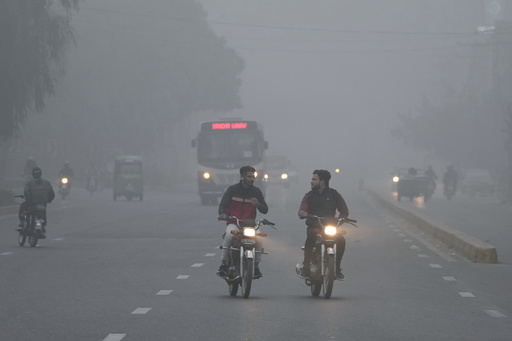
MULTAN, Pakistan — In response to a dire public health crisis, Pakistani authorities have rolled out mobile clinics and increased hospital bed availability as they contend with nearly 70,000 patients daily suffering from respiratory issues, exacerbated by the ongoing hazardous smog enveloping the eastern regions of the country.
Punjab, the most densely populated province with 127 million inhabitants, has faced an unprecedented wave of pollution since October. According to the United Nations children’s agency, the health and well-being of approximately 11 million children in the province are currently under severe threat.
On Wednesday, Lahore and Multan, the two major cities severely impacted by the smog, were reported to be the most polluted worldwide, with air quality index scores lingering around 400. This level far exceeds the threshold of 300, which is classified as hazardous.
Experts attribute the perilous air quality to several factors, including high traffic volumes, extensive construction and industrial activities, as well as the burning of agricultural waste linked to the onset of the winter wheat planting season.
In response, over 200 mobile clinics have been dispatched throughout Punjab to cater to those who are unable to afford medical care or reach hospitals, particularly the elderly. Aun Abbas, a senior health official, stated that these clinics, equipped for basic lab tests, allow onboard doctors to prescribe necessary medications for patients.
Uzma Bukhari, the spokesperson for the provincial government, further reported that state-run hospitals have treated more than 2.1 million individuals affected by the smog, with expectations for this number to escalate.
To protect children from the harmful effects, school closures have been mandated in the province until November 17, along with the temporary closure of parks and museums until November 18. Health professionals are urging the public to limit travel and to wear face masks when outside.
Azam Mushtaq, a physician at Nishtar Hospital in Multan, highlighted that a significant number of patients suffering from respiratory illnesses have been arriving at hospitals after neglecting to wear masks. Asthma patients are reported to be particularly hard-hit, struggling to breathe even with oxygen support, according to an on-the-scene report.
Many individuals are disregarding the mask requirement, resulting in fines from local authorities, while traffic police are cracking down on drivers of vehicles that produce excessive smoke.
Weather forecasts indicate the possibility of light rain in various regions of Punjab, which may help alleviate some of the pollution. Authorities are also exploring options for inducing artificial rainfall as a measure to combat the ongoing environmental crisis in the province.
